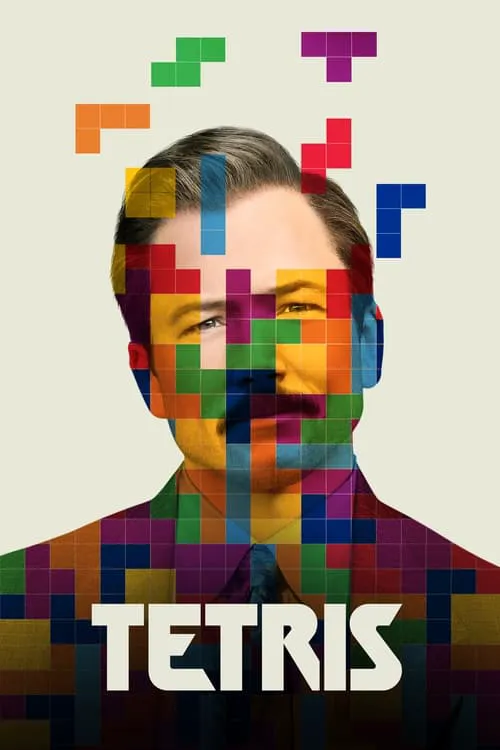Tetris

Plot
In the 1980s, the world of video games was rapidly evolving. Gamers and enthusiasts worldwide were searching for a new challenge, a new experience that would captivate and thrill them. And then, in 1988, American video game salesman Henk Rogers stumbled upon something that would change the gaming landscape forever: Tetris. Developed by Alexey Pajitnov, a young computer programmer in the Soviet Union, Tetris was initially meant as a demonstration program for computer enthusiasts. Its addictive gameplay, where players rotated and arranged falling blocks to create solid lines, quickly gained popularity within the Soviet community. Henk Rogers, a seasoned gamer and entrepreneur, was on a business trip in Tokyo when he discovered Tetris. Intrigued by its simplicity and addictive nature, he saw an opportunity to bring the game to the masses. He traveled to the Soviet Union with the hope of licensing the game, but little did he know that he would be entering a complex and treacherous world of lies, corruption, and bureaucratic red tape. Rogers' first stop was the Soviet Union's Ministry of Communications, where he hoped to meet with the creators of Tetris, Alexey Pajitnov and his team. However, he soon found himself caught up in a web of intrigue, as government officials and high-ranking military officers took an interest in the game's potential revenue streams. Pajitnov, a talented programmer, was initially hesitant to license Tetris. He was proud of his creation and wasn't sure he wanted to share it with the outside world. Rogers, however, struck a chord with him, explaining the potential of Tetris to reach a global audience and create a new standard for electronic entertainment. Rogers and Pajitnov formed a partnership to export Tetris, with Rogers handling the business side of things and Pajitnov handling the programming and distribution. But as they delved deeper into the world of Soviet bureaucracy, they encountered formidable obstacles. Rogers navigated the treacherous landscape of Soviet politics, negotiating with officials who seemed to be as interested in exploiting Tetris for their own gain as they were in promoting its global success. The stakes were high, with multiple factions vying for control of the game's rights, royalties, and distribution channels. Rogers' luck changed when he met Robert Stein, a charismatic and well-connected businessman who had previously made a fortune in the movie industry. Stein, a seasoned negotiator and fixer, saw the potential of Tetris to surpass the success of previous exports and chose to ally himself with Rogers. Together, Rogers and Stein formed a formidable team, able to navigate the complexities of Soviet politics and negotiations with ease. However, their relationship was not without tension, as Stein's ruthless approach sometimes put him at odds with Pajitnov, who was increasingly concerned about the integrity of his beloved game. Meanwhile, back in the United States, a second front in the Tetris war was beginning to unfold. A rival group, led by Jack Tramiel, the founder of Commodore International, sought to acquire the rights to Tetris and exploit its popularity to sell Commodore computers. Tramiel's efforts were driven by his vision for a popular and lucrative gaming market, but Rogers saw the Commodore executive as a ruthless adversary, willing to do whatever it took to sabotage their plans and claim the rights to Tetris for himself. The stakes were higher than ever as Rogers and Stein delved deeper into the world of Soviet politics, battling officials and bureaucrats in their quest to bring Tetris to the masses. From high-stakes conferences in luxurious hotel suites to tense negotiations in cramped Moscow back rooms, the battle for control of Tetris took on a narrative of its own. Through it all, Rogers, Stein, Pajitnov, and others remain true to their initial vision of Tetris – a game that was meant to bring people together and provide a platform for enjoyment and creativity. Set against a backdrop of global change and upheaval, Tetris stands as a testament to the power of a simple, yet addictive idea to capture the world's hearts and imagination. In the end, Rogers and Stein would face a fierce battle in a Tokyo courtroom to secure the rights to Tetris. It was a case that tested not only the skills and cunning of the two entrepreneurs, but their ability to remain true to their artistic vision, and to resist the allure of shortcuts, backroom deals, and a sea of bureaucratic red tape. But ultimately, Tetris emerged triumphant, beating the world to a frenzy, earning a niche as one of the greatest video games of all time and showcasing its lasting durability.
Reviews
Recommendations




